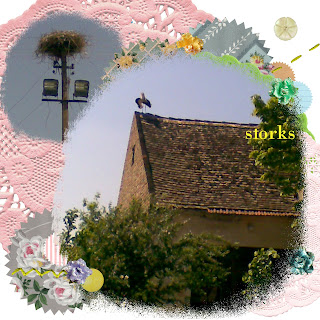Today, I visited a timeless village. As we approached from the highway, there were more and more clusters of cows, some beneath the shade of the trees lining the road, some out in the open. There were also clusters of sheep, doing sheep things by the side of the way. The sky stretched up beyond these collections of animals, and we kept driving until we reached a turn in the road.
There, we were met by the kind of small house that no one builds anymore. One after the other until we had passed about a dozen and reached the centre of the village, marked by the church and the post office.
Just as prominent as those edifices were the storks, like the pair in the photo below. These pairs of village storks return to the village year after year, and the villagers know which weeks to expect them.
In this small place, one of the greatest minds of the twentieth century was born. He himself explained that it was partly the cows, partly the tradition, but especially the timelessness of the stars and faith that led him to his later discoveries.
Last night, I was reading Plato's Theaetetus again, that great conversation about the nature of knowledge. My favourite part is where Socrates compares the role of the philosopher with that of the lawyer, who is wily in terms of convention, but when the philosopher "draws him into the air" with questions of birth, death and happiness, he seeks revenge. "Such are the two pictures: the one of the philosopher and gentleman, who may be excused for not having learned how to make a bed, or cook up flatteries; the other, a serviceable knave, who hardly knows how to wear his cloak,—still less can he awaken harmonious thoughts or hymn virtue's praises."
I have noticed the philosopher in all great thinkers. The great scientist J.C. Maxwell wrote that, "It is only when we contemplate, not matter in itself, but the form in which it actually exists, that our mind finds something on which it can lay hold." He was known to be able to abstract thoughts into symbols (much as Socrates was able, see Thaet.) - but the common element I wish to stress here is the ability to abstract, to ponder the stars. Plato's Timaeus-Critias explains that cosmology teaches us how to live our lives; it teaches us goodness and beauty.
And is it not easier to see the stars outside of the city, where there is less or no interference? So can we say that such remote locations, in villages or not, are closer to a timelessness that we need "even today"?
Elements: doilies, starbursts and roses: puglypixel;
buttons , embroidery and photo shapes: minitoko.


No comments:
Post a Comment